Red Bavaria. How to create a Soviet republic in Munich
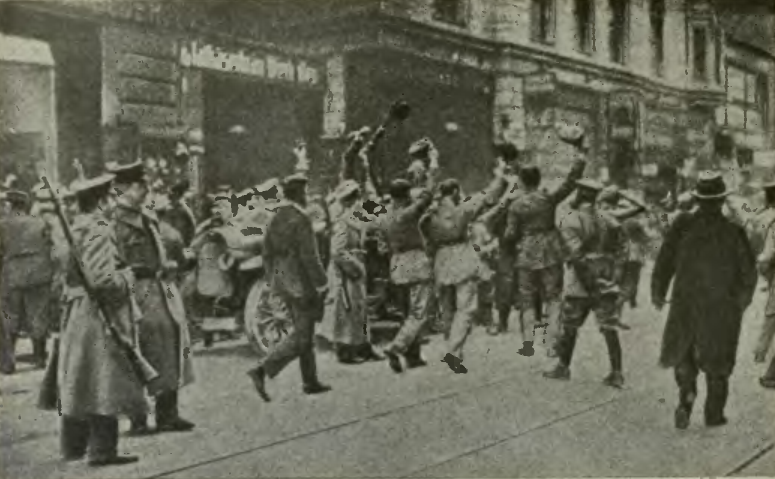
Revolutionary upsurge in Germany in 1918-1919 was the result not only and not so much of the Russian revolution 1917 of the year, as the defeat of the German Empire in the First World War and the associated political and socio-economic crisis. The same problems experienced the lands of the ceased existence of Austria-Hungary - and there, too, their own revolutionary uprisings took place. Thus, the Hungarian Soviet Republic was proclaimed in Budapest.
Recall that the German Empire before 1918, was a kind of "federation of monarchies." In addition to the emperor - the Prussian king, in their own lands ruled their own monarchs. In Bavaria, the royal dynasty of Wittelsbach was in power. Against her in November 1918, mass popular actions began in Munich - the main city of Bavaria. Although the last Bavarian king Ludwig III Wittelsbach (1845-1921) was considered a fairly liberal monarch, and in 1906, while still a crown prince, spoke in favor of universal suffrage, having won the approval of the socialist leader August Bebel, the defeat of the German Empire in World War I put the final point in his reign. The people accused the king of blindly following the interests of Prussia, refusing to protect the real interests of Bavaria. Finally, as a result of mass popular demonstrations, Kurt Eisner, a member of the Independent Social Democratic Party of Germany (NSPD), at a meeting of the Munich Council of Workers 'and Soldiers' Deputies on the night of 8 in November 1918 of the year announced the overthrow of King Ludwig III Wittelsbach and the liquidation monarchical form of government in Bavaria. In accordance with this decision, Bavaria was proclaimed a republic. 8 November The 1918 Interim Government was formed by the Provisional Government of Bavaria under the leadership of Kurt Eisner, who occupied not only the Prime Minister, but also the Minister of Foreign Affairs. The deposed King Ludwig III Wittelsbach 13 on November 1918 of the year officially announced his abdication, but so far continued to be in Bavaria. The era of government in Bavaria of the Wittelsbach dynasty, which lasted from the XII century, came to an end.
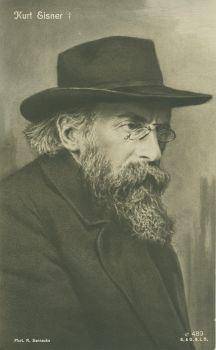 Meanwhile, on January 12, 1919, the elections to the Landtag were held - the regional parliament. On them the majority of votes received the right Catholic Bavarian People's Party. Only 2,53% of voters voted for the Independent Social Democratic Party of Germany - a negligible amount. NSDPG received, in connection with the elections, the entire 3 place in the Landtag. Accordingly, the government of Kurt Eisner, which did not reflect the interests of the majority of the voters, should have resigned. 21 February 1919 of the year Kurt Eisner left for the Bavaria Landtag, where he was to officially resign as Prime Minister of Bavaria. However, on the way he was shot by a young aristocrat, Count Anton von Arco-Valli (1897-1945) - a well-known monarchist who belonged to the ultra-right circles of the Bavarian aristocracy and hated Kurt Eisner as a native of Berlin, a socialist and, moreover, a Jew by nationality. It is noteworthy that Count von Arco-Valli himself was also half Jewish - by his mother. For this, in fact, he was not accepted into the protonacist Thule Society - they decided that the count, despite its aristocratic origin, was not sufficiently pure-blood.
Meanwhile, on January 12, 1919, the elections to the Landtag were held - the regional parliament. On them the majority of votes received the right Catholic Bavarian People's Party. Only 2,53% of voters voted for the Independent Social Democratic Party of Germany - a negligible amount. NSDPG received, in connection with the elections, the entire 3 place in the Landtag. Accordingly, the government of Kurt Eisner, which did not reflect the interests of the majority of the voters, should have resigned. 21 February 1919 of the year Kurt Eisner left for the Bavaria Landtag, where he was to officially resign as Prime Minister of Bavaria. However, on the way he was shot by a young aristocrat, Count Anton von Arco-Valli (1897-1945) - a well-known monarchist who belonged to the ultra-right circles of the Bavarian aristocracy and hated Kurt Eisner as a native of Berlin, a socialist and, moreover, a Jew by nationality. It is noteworthy that Count von Arco-Valli himself was also half Jewish - by his mother. For this, in fact, he was not accepted into the protonacist Thule Society - they decided that the count, despite its aristocratic origin, was not sufficiently pure-blood. The killing of Eisner immediately led to a sharp aggravation of the already tense political situation in Bavaria. The chairman of the Bavarian branch of the SPD, Erhard Auer, was seriously wounded in the Diet by a communist. In a shootout, a deputy from the Bavarian People’s Party died and one of the secretaries of the war ministry was fatally wounded. Riots began. Ex-King Ludwig Wittelsbach, fearing for his life, hastily left Bavaria and settled in Austria, and then in Liechtenstein. Meanwhile, constant rallies and demonstrations continued to take place in the Bavarian Republic. After the assassination of Kurt Eisner, the government was headed first by the poet Ernst Toller, which will be discussed below, and from March 17 - by Johann Hoffmann. The Central Council of the Bavarian Republic was headed by Ernst Nikish - a member of the Independent Social-Democratic Party of Germany, and later - one of the ideologists of national Bolshevism, a new political ideology born in Germany of the 1920s. However, the radical left masses wanted more. An example for Bavaria was neighboring Hungary, where 20 March 1919 was proclaimed the Soviet republic. Inspired by the Hungarian example, the Bavarian leftists dreamed of creating a union between Soviet Russia, the Hungarian Soviet Republic and Red Bavaria, which should bring, in their opinion, the coming revolutions in all countries of Eastern and Western Europe.
Johann Hoffmann, formally remaining the head of the government of Bavaria, actually lost all power and did not control the situation in the region. The Landtag of Bavaria was broken up by the revolutionary-minded soldiers of the Munich garrison, and Hoffmann himself was forced to go to Berlin to ask for help. In the capital of Germany, Hoffmann was unhappy because he could not take control of the situation in Bavaria and restore the system of government.
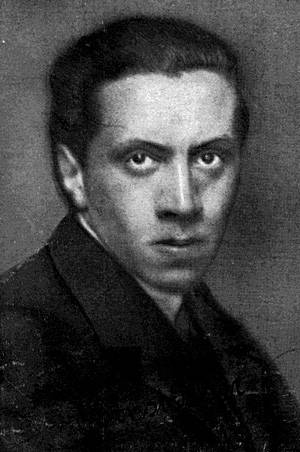
Increasing popular unrest resulted in the proclamation of 6 on April 1919 of the Bavarian Soviet Republic. Its first president was 25-year-old poet and playwright Ernst Toller (1893-1939, in the photo). A native of the Prussian town Zamotshin, Ernst Toller was born into a wealthy Jewish family. He entered the University of Grenoble, however, when World War I began, he volunteered for the front. But the horrors of war dramatically changed the worldview of a young man. Thirteen months on the front line turned Toller into a staunch pacifist. After more than a year of service, he was demobilized due to illness. He spent some time in Berlin, then entered the University of Heidelberg, where he founded an anti-war circle - the Cultural-Political Union of German Youth. However, the activities of this organization immediately attracted the attention of the police. Its members were expelled from the university and sent to the front, and Toller, as already demobilized from the army, was arrested and put in a military prison. Toller's mother tried to make his fate easier and succeeded in transferring her son to a psychiatric hospital, but the conditions there were even worse, and Toller preferred to get back to prison. Freed, he arrived in Munich, where he became close with the local leader of the anti-war social democratic movement Kurt Eisner. However, soon Toller was put back in prison, where he stayed until the end of the war. In 1919, Mr. Toller came to Munich again to help Eisner, who became the Prime Minister of the Bavarian Republic, but just at that time Kurt Eisner was shot by Count von Arco-Wally. In this situation, Toller took the most active part in mass popular unrest in Munich and became one of the key leaders of the Bavarian Soviet Republic. During the week, from 6 to 12 on April 1919, Toller served as president of the Bavarian Soviet Republic.
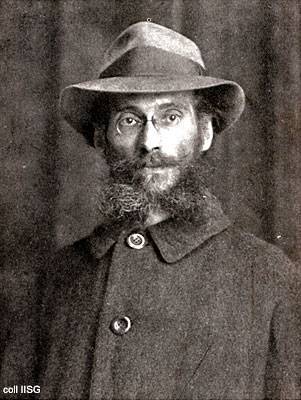 Among the other leaders of the Bavarian Soviet Republic were German anarchists known at the time — Gustav Landauer (pictured) and Erich Muzam. Philosopher and writer Gustav Landauer (1870-1919) was educated at Heidelberg and Berlin Universities, where he studied philosophy and German philology. As a young man, he became interested in anarchist ideas, studied the works of Pierre Joseph Proudhon and Peter Kropotkin, and then became the editor of the anarchist socialist magazine Socialist. Landauer developed his own concept of revolution, which was considered in the context of the birth of a new man. Having experienced a great influence of anarcho-individualistic concepts, Landauer believed that a socialist society could be born as a result of the struggle of individuals who, within the framework of the old exploitative society, create centers of a new type of social order. During his life, Landauer was twice imprisoned — in 1893 for “incitement to insurrection” that allegedly took place in the novel “The Preacher of Death”, and in 1899 for anarchist propaganda. In 1914, along with his friend the philosopher Martin Buber, Landauer tried to create an anti-war committee. As a prominent politician and scholar, an expert on the history of the French Revolution, at the beginning of 1919, Landauer was invited to the post of Minister of Public Education in the government of the Bavarian Republic. Landauer's first and only decree in the new post was a ban on history lessons in Bavaria schools — Landauer believed that it was not necessary to study the political history of an exploitative society in a revolutionary republic. However, Landauer's ministerial position was not long - he soon left the government, coming into conflict with the Bavarian communists.
Among the other leaders of the Bavarian Soviet Republic were German anarchists known at the time — Gustav Landauer (pictured) and Erich Muzam. Philosopher and writer Gustav Landauer (1870-1919) was educated at Heidelberg and Berlin Universities, where he studied philosophy and German philology. As a young man, he became interested in anarchist ideas, studied the works of Pierre Joseph Proudhon and Peter Kropotkin, and then became the editor of the anarchist socialist magazine Socialist. Landauer developed his own concept of revolution, which was considered in the context of the birth of a new man. Having experienced a great influence of anarcho-individualistic concepts, Landauer believed that a socialist society could be born as a result of the struggle of individuals who, within the framework of the old exploitative society, create centers of a new type of social order. During his life, Landauer was twice imprisoned — in 1893 for “incitement to insurrection” that allegedly took place in the novel “The Preacher of Death”, and in 1899 for anarchist propaganda. In 1914, along with his friend the philosopher Martin Buber, Landauer tried to create an anti-war committee. As a prominent politician and scholar, an expert on the history of the French Revolution, at the beginning of 1919, Landauer was invited to the post of Minister of Public Education in the government of the Bavarian Republic. Landauer's first and only decree in the new post was a ban on history lessons in Bavaria schools — Landauer believed that it was not necessary to study the political history of an exploitative society in a revolutionary republic. However, Landauer's ministerial position was not long - he soon left the government, coming into conflict with the Bavarian communists. The third prominent left-wing intellectual who stood at the origins of the Bavarian Soviet Republic was poet and playwright Erich Muzyam (1878-1934). From a young age, Muzam revolved in a bohemian environment, in 1900 he joined the New Society group that preached a way of life in the communes, where he met and became close to Gustav Landauer. Then, in 1904, he moved to Switzerland for a while, then began to publish a newspaper with the characteristic name "Cain." Interestingly, with the beginning of World War I, Muzam first took nationalist positions, but then quickly reoriented himself under the influence of anarchist comrades and became a staunch opponent of the war.
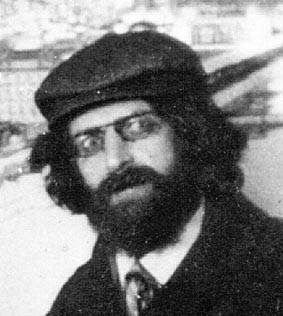 In April, 1918, Muzam (pictured), among other anti-war agitators, was arrested and imprisoned, but in the fall he was released and announced in Munich. Three intellectuals - Ernst Toller, Gustav Landauer and Erich Muzam - defined the cultural face of the Bavarian revolution. They became part of the first government of the Bavarian Soviet Republic, which existed from 6 to 12 in April 1919.
In April, 1918, Muzam (pictured), among other anti-war agitators, was arrested and imprisoned, but in the fall he was released and announced in Munich. Three intellectuals - Ernst Toller, Gustav Landauer and Erich Muzam - defined the cultural face of the Bavarian revolution. They became part of the first government of the Bavarian Soviet Republic, which existed from 6 to 12 in April 1919. The short history of the Bavarian Soviet Republic is clearly divided into two periods. The First Bavarian Republic, which existed before 12 on April 1919, was characterized by the predominant role of independent Social Democrats - followers of the murdered Kurt Eisner, as well as active participation of anarchists in the government of the republic. As for the Communists, they at first distanced themselves from participation in the government of the First Bavarian Soviet Republic. Moreover, the communist agitators tried in every way to hinder the activities of independent social democrats and anarchists, accusing them of "social treason". However, in the end, the communist leadership decided to take power in the Bavarian Soviet Republic into their own hands. Moreover, independent social democrats and anarchists were not able to keep it - the fact that the leaders of the first republic were mainly representatives of intellectual circles and bohemians.
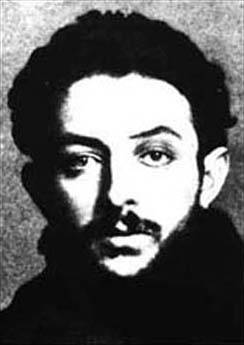 13 April 1919 was proclaimed the Second Bavarian Soviet Republic. Its president was Yevgeny Levin (1883-1919). A native of St. Petersburg, Yevgeny Levin was born in a Jewish family of merchant Julius Levin and his wife Rosalia Goldberg. When Eugene was only three years old, his father Julius died, and his mother left for Germany in Wiesbaden with her child. In his youth, Yevgeny Levin studied law at the university, where he met with Russian revolutionary émigrés and went to Russia. In 1905, he participated in the revolutionary events as part of the Socialist Revolutionary Party. Returning to Germany, Levin became a professional revolutionary. He headed the government of the Second Bavarian Soviet Republic.
13 April 1919 was proclaimed the Second Bavarian Soviet Republic. Its president was Yevgeny Levin (1883-1919). A native of St. Petersburg, Yevgeny Levin was born in a Jewish family of merchant Julius Levin and his wife Rosalia Goldberg. When Eugene was only three years old, his father Julius died, and his mother left for Germany in Wiesbaden with her child. In his youth, Yevgeny Levin studied law at the university, where he met with Russian revolutionary émigrés and went to Russia. In 1905, he participated in the revolutionary events as part of the Socialist Revolutionary Party. Returning to Germany, Levin became a professional revolutionary. He headed the government of the Second Bavarian Soviet Republic. Unlike the anarchists and the independent social democrats, the Communists immediately began to organize the authorities and the power structures of the new republic. The formation of the Red Army began, with the commander and military commander of Munich appointed 22-year-old sailor Rudolf Egelhofer. Persecution of any opposition movements began, including the same anarchists who had recently been among the organizers of the Soviet republic themselves. The Bavarian Communists used the practice of taking hostages - they detained a number of activists of the right-wing “Thule Society”.
The “right hand” of Eugene Levin was Max Levin (1885-1937). Like Yevgeny Levin, Max Levin was born in Russia - in Moscow, in the family of a rich German Jew, Ludwig Levin. In the biography of Levin and Levin much in common. Max Levin also studied at a university in Germany, then returned to Russia, where he joined the Socialist Revolutionary Party and participated in the 1905-1907 revolution, even was arrested and imprisoned. After his release, Levin went to Switzerland, where he established contacts with the Russian Social Democrats and personally with Vladimir Lenin. In 1914-1918 Max Levine served in the Royal Bavarian Guards Infantry Regiment. In November, 1918 Mr. Levin joined the Soviets of Soldiers' Deputies, joined the Spartacist group, and later participated in the founding congress of the Communist Party of Germany.
To be continued ...
Information